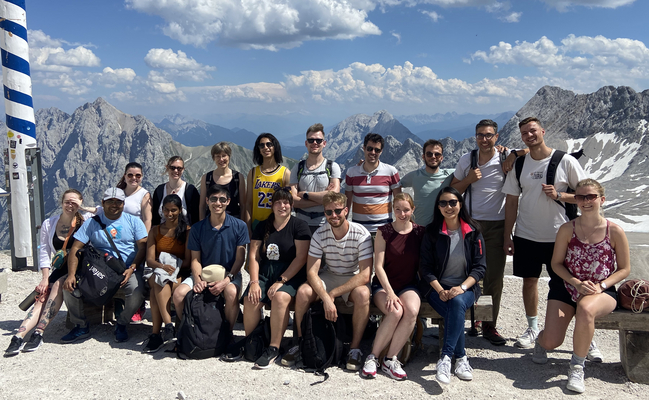Projects Offered
Petra Beli Mark Helm Ulrich Hohmann Edward Lemke Laura Lorenzo Orts Katja Luck Helle Ulrich Siyao Wang Johannes Mayer_DC3 Johannes Mayer_Interactome Wolfram RufUbiquitin & Genome Stability
2 PhD projects offered in the IPP winter call Molecular Mechanisms in Genome Stability & Gene Regulation
Scientific Background
We study regulatory mechanisms that govern cellular quality control. On the one hand, we are interested in DNA repair pathways and factors that ensure complete and accurate DNA replication in the face of DNA damage. On the other hand, we investigate the diverse signalling functions of the posttranslational protein modifiers, ubiquitin and SUMO. Most of our ongoing projects are therefore situated at the interface between protein regulation and genome maintenance. In our research, we combine methods in genetics, molecular and cell biology with protein biochemistry and advanced genomics tools, using both budding yeast and human cells as models.
PhD Project 1: Deciphering the ubiquitin code
The ubiquitin system plays a key role in determining the function and fate of proteins in virtually every biological pathway, including genome maintenance and gene expression. Most often, ubiquitin signalling is mediated by polyubiquitin chains attached to selected substrate proteins. Depending on the linkage between the individual ubiquitin moieties, such chains can adopt many distinct geometries and - by means of linkage-selective downstream effectors - convey distinct biological effects. In this manner, the ubiquitin system is implicated in a variety of pathways that protect us from diseases such as cancer, neurodegeneration and inflammation.
In our lab, we have developed tools that allow us to a) induce the polyubiquitylation of relevant cellular proteins in a controlled and linkage-selective manner, as well as b) identify selectively modified substrates, the responsible enzymes and linkage-selective interaction partners. Here we will apply these tools to the investigation of ubiquitin signalling in selected biological contexts, including the processing of DNA polymerase-blocking lesions during DNA replication and the ubiquitin-dependent damage response pathway at DNA double-strand breaks. The project will involve biochemical as well as cell and molecular biological approaches and aims to eluciate the relevance of ubiquitin signalling in cellular resilience mechanisms against ageing and disease.
If you are interested in this project, please select Ulri_ubi as your group preference in the IPP application platform.
PhD Project 2: Mechanisms of replicative DNA damage bypass
One of the areas where ubiquitylation plays a major regulatory role is during genome replication, where DNA is particularly vulnerable to decay. Accordingly, the capacity of cells to deal with replication stress is a major factor protecting us from genome instability and cancer. Yet, the molecular details of how a replication fork travels across a damaged template are poorly understood. A multitude of factors, including the ubiquitylation of the replication factor PCNA, have been implicated in this process, but many questions remain: what determines whether a replisome stalls or simply moves across a lesion? How do replication forks reverse or collapse upon prolonged stalling? How do they recover? What is the influence of chromatin?
To address these questions, we are combining tools such as fluorescence microscopy, chromatin immunoprecipitation, next-generation sequencing, and quantitative mass spectrometry, to examine the influence of factors like chromatin structure, cell cycle, and replication timing on damage processing. We engage in collaborative research for real-time measurements of replication fork progression in live cells and develop methods for the genome-wide mapping of lesions and replication intermediates. In this manner, we aim to determine the interdependencies and hierarchies of the factors involved in ubiquitin-dependent lesion bypass.
If you are interested in this project, please select Ulri_DNA as your group preference in the IPP application platform.
Publications relevant to these projects
Renz C, Asimaki E, Meister C, Albanèse V, Petriukov K, Krapoth NC, Wegmann S, Wollscheid HP, Wong RP, Fulzele A, Chen JX, Léon S and Ulrich HD (2024) Ubiquiton-An inducible, linkage-specific polyubiquitylation tool. Mol Cell 84:386-400 Link
Shi J, Hauschulte K, Mikicic I, Maharjan S, Arz V, Strauch T, Heidelberger JB, Schaefer JV, Dreier B, Plückthun A, Beli P, Ulrich HD and Wollscheid HP (2023) Nuclear myosin VI maintains replication fork stability. Nat Commun 14:3787 Link
Wegmann S, Meister C, Renz C, Yakoub G, Wollscheid HP, Takahashi DT, Mikicic I, Beli P and Ulrich HD (2022) Linkage reprogramming by tailor-made E3s reveals polyubiquitin chain requirements in DNA-damage bypass. Mol Cell, 82:1589-1602 Link
Sriramachandran AM, Petrosino G, Mendez-Lago M, Schafer AJ, Batista-Nascimento LS, Zilio N and Ulrich HD (2020) Genome-wide nucleotide-resolution mapping of DNA replication patterns, single-strand breaks, and lesions by GLOE-Seq.Mol Cell 78:975-985 Link
Wong RP, Garcia-Rodriguez N, Zilio N, Hanulova M and Ulrich HD (2020) Processing of DNA polymerase-blocking lesions during genome replication is spatially and temporally segregated from replication forks.Mol Cell 77:3-16 Link
